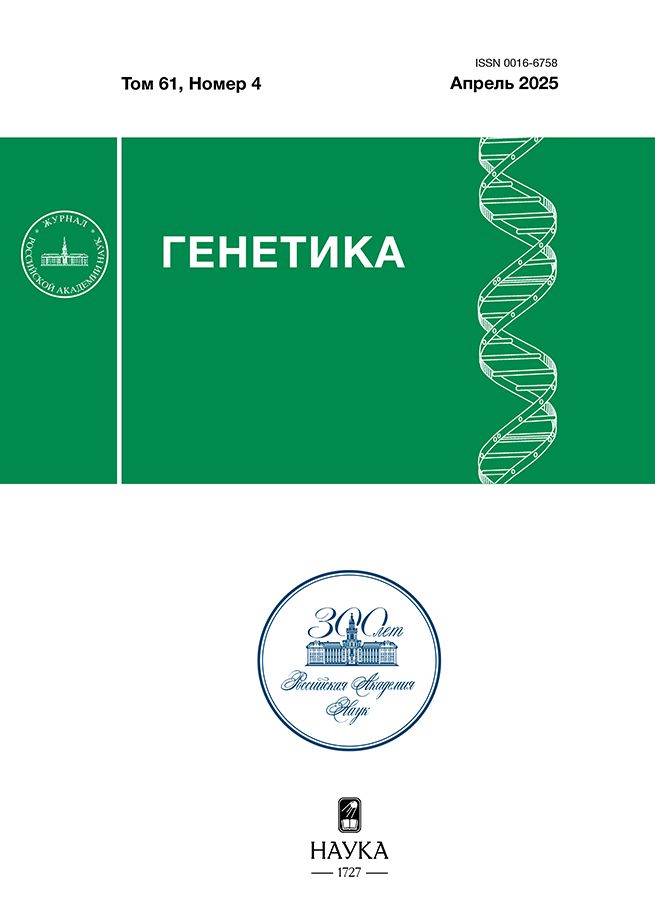Polymorphism of the rs1421085 locus of the FTO gene in human populations: genogeographic aspect
- Авторлар: Malyarchuk B.А.1, Litvinov A.N.1
-
Мекемелер:
- Institute of Biological Problems of the North, Far East Branch of the Russian Academy of Sciences
- Шығарылым: Том 61, № 4 (2025)
- Беттер: 86-93
- Бөлім: ГЕНЕТИКА ЧЕЛОВЕКА
- URL: https://ruspoj.com/0016-6758/article/view/682206
- DOI: https://doi.org/10.31857/S0016675825040098
- EDN: https://elibrary.ru/UAJGUO
- ID: 682206
Дәйексөз келтіру
Аннотация
The variability of the FTO gene is of great interest to geneticists and clinicians because of the association of polymorphic variants of this gene in human populations with body weight and obesity, which in turn leads to a variety of diseases. One of the most studied polymorphic loci of the FTO gene is rs1421085. The T®C substitution in this locus results in the rs1421085-C allele, which increases the risk of obesity-related pathologies. The study of human brown adipose tissue has revealed that individuals carrying the rs1421085-C allele exhibit a heightened expression of thermogenic genes and thermogenesis in general compared to T carriers. This observation led to the formulation of the hypothesis that the distinctive patterns of the rs1421085-C geographical distribution in populations reflect the processes of human adaptation to cold, particularly in the northern regions of the planet. To test this hypothesis, we conducted a study on the distribution of polymorphic variants of the rs1421085 locus in modern and ancient populations of Siberia and other regions of the world. The results demonstrated that the frequency of the rs1421085-C variant did not exhibit an increase in the northern direction in both modern and ancient Siberian populations and is maximal in populations of the Middle East and Europe. It seems plausible that this variant of the FTO gene polymorphism may have been a target for natural selection at the earliest stages of adaptation of ancient humans to cold, in the territory of Western Eurasia.
Негізгі сөздер
Толық мәтін
Авторлар туралы
B. Malyarchuk
Institute of Biological Problems of the North, Far East Branch of the Russian Academy of Sciences
Хат алмасуға жауапты Автор.
Email: malbor@mail.ru
Ресей, Magadan
A. Litvinov
Institute of Biological Problems of the North, Far East Branch of the Russian Academy of Sciences
Email: malbor@mail.ru
Ресей, Magadan
Әдебиет тізімі
- Dina C., Meyre D., Gallina S. et al. Variation in FTO contributes to childhood obesity and severe adult obesity // Nat. Genet. 2007. V. 39. P. 724–726. https://doi.org/10.1038/ng2048
- Meyre D., Delplanque J., Chèvre J.C. et al. Genome-wide association study for early-onset and morbid adult obesity identifies three new risk loci in European populations // Nat. Genet. 2009. V. 41. P. 157–159. https://doi.org/10.1038/ng.301
- Loos R.J., Yeo G.S. The bigger picture of FTO: The first GWAS-identified obesity gene // Nat. Rev. Endocrinol. 2014. V. 10. P. 51–61. https://doi.org/10.1038/nrendo.2013.227
- Yin D., Li Y., Liao X. et al. FTO: А critical role in obesity and obesity-related diseases // Br. J. Nutr. 2023. V. 130. P. 1657–1664. https://doi.org/10.1017/S0007114523000764
- Кучер А.Н. Ген FTO и болезни: значимость генетического полиморфизма, эпигенетических модификаций и средовых факторов // Генетика. 2020. Т. 56. № 9. С. 985–1005. https://doi.org/10.31857/S0016675820090131
- Price R.A., Li W.D., Zhao H. FTO gene SNPs associated with extreme obesity in cases, controls and extremely discordant sister pairs // BMC Med. Genet. 2008. V. 9. P. 4. https://doi.org/10.1186/1471-2350-9-4
- Claussnitzer M., Dankel S.N., Kim K.H. et al. FTO obesity variant circuitry and adipocyte browning in humans // N. Eng. J. Med. 2015. V. 373. P. 895–907. https://doi.org/10.1056/NEJMoa1502214
- Zhang Z., Chen N., Yin N. et al. The rs1421085 variant within FTO promotes brown fat thermogenesis // Nat. Metab. 2023. V. 5. P. 1337–1351. https://doi.org/10.1038/s42255-023-00847-2
- Yin N., Zhang D., Wang J. The FTO variant conferring enhanced UCP1 expression is linked to human migration out of Africa // Life Metabolism. 2024. V. 3. https://doi.org/10.1093/lifemeta/loae027
- Попович А.А., Трифонова Е.А., Бочарова А.В. и др. Генетическое разнообразие в якутской популяции по локусам, ассоциированным с индексом массы тела и ожирением // Якутский мед. журнал. 2019. Т. 3. С. 23–26. https://doi.org/10.25789/YMJ.2019.67.06
- Иевлева К.Д., Баирова Т.А., Шенеман Е.А. и др. Вклад носительства полиморфных локусов генов энергетического обмена в метаболические нарушения у подростков двух этнических групп с избыточной массой тела // Бюл. эксперим. биол. и медицины. 2021. Т. 172. С. 440–444. https://doi.org/10.47056/0365-9615-2021-172-10-440-444
- Cardona A., Pagani L., Antao T. et al. Genome-wide analysis of cold adaption in indigenous Siberian populations // PLoS One. 2014. V. 9. https://doi.org/10.1371/journal.pone.0098076
- Fumagalli M., Moltke I., Grarup N. et al. Greenlandic Inuit show genetic signatures of diet and climate adaptation // Science. 2015. V. 349. P. 1343–1347. https://doi.org/10.1126/science.aab2319
- Vallini L., Zampieri C., Shoaee M.J. et al. The Persian plateau served as hub for Homo sapiens after the main out of Africa dispersal // Nat. Commun. 2024. V. 15. P. 1882. https://doi.org/10.1038/s41467-024-46161-7
Қосымша файлдар













